Moira Millán is a force to be reckoned with — a weychafe in the Mapuche tradition, or as she explains it, a warrior, a fighter, a defender. “To be a Weychafe is to be the defense of the territory, the defense of life. And that is the spirit that inhabits me.”
Moira had just traveled all the way from near the bottom of the planet, from Wallmapu – the ancestral lands of the Mapuche people, more commonly known as Patagonia – to present at the prestigious International Book Fair. I was delighted to have the chance to finally meet her in person.
I met her in the Hilton, which she was quick to tell me is guilty of ecocide and worse in many of the sites where it displaces communities in order to build its resorts. Still, it was a chance for her to raise the visibility of her cause, which is nothing less but the fall of the patriarchy, led by a growing and fiercely activated network of Indigenous women, and its replacement with the traditional values of reciprocity, respect and the right to a good life for all beings, human and non-human alike.
Para leer este artículo en Español, hacer click AQUÍ
Her talk was unfortunately short, given that the organizers had put her on a panel with four other people. But it was well worth capturing, and I share a translated version here.
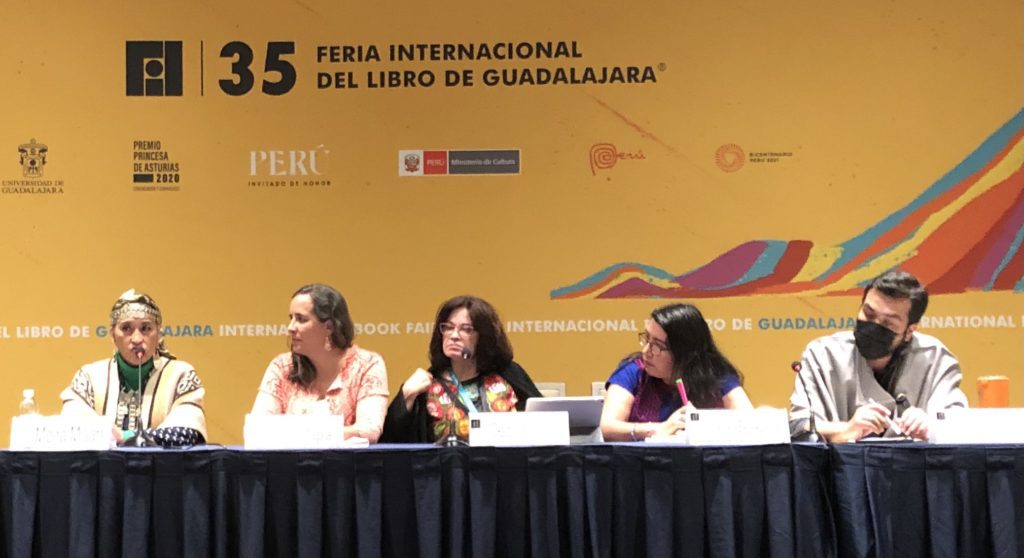
I am going to try in a few minutes to tell 14,000 years of history and the concepts that we have been developing from active resistance and the defense of our identity and our territoriality. I was thinking how to approach this conversation with you. It seems to me that the first thing is to present myself as from the place where I announce myself as an indigenous woman, as a weychafe, as a woman warrior, that we intend to recover our worldview, our way of understanding and inhabiting the world, that is cosmocentristic. Thinking about this from the left and the right, that binaryism that the colonial republics have inherited and have reduced us to, that binary thinking that leads us to where we have to dispute where we are.
Indigenous peoples remain neither on the left side nor on the right, but come from a place of cosmocentrism. And this word implies a deep concept, it brings memory, it brings territoriality, it brings cosmography instead of the current geopolitics. When we think about the worlds, unfortunately we always refer to the construction of the geopolitics of the invading states on our territory. The Mapuche nation, for example, does not feel either Argentine or Chilean. It is Mapuche.
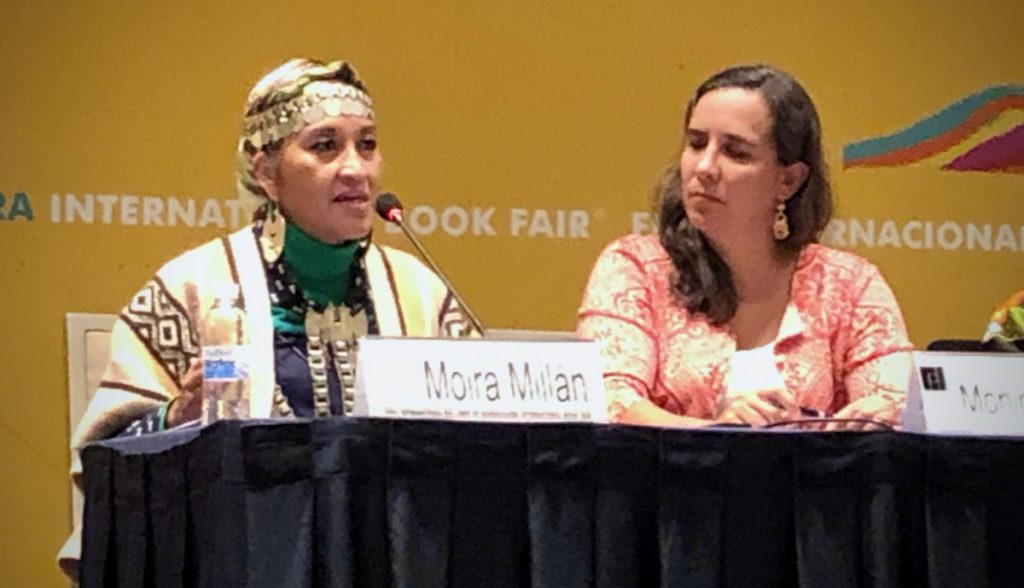
14,000 years of history. The loss of our freedom is recent, barely 120 years of loss of that freedom. It is very important for us to highlight this, because in Argentina the Mapuche struggle is being demonized and it is posed as foreignization, as the internal enemy. It is said that the Mapuche come from Chile. In Chile it is said that we come from Argentina. Sometimes in a funny way I ask if we are extraterrestrial because we are not from one side or the other, so where are we from? And in reality it is this ignorance of trying to make a reductionism of the reading of the conflict from the geopolitics of the colonial states.
Cosmocentrism, in short, then, poses a way of inhabiting the world, a way of feeling our cosmographic territoriality, in fact. They talk about the problem of migration. From the Indigenous women’s movement, the migrant category seems to us to be a completely colonial category, because in reality, from the cosmography that we claim, all humanity has always had the right to transhumance. In reality there was no emigration, there was transhumance. And that is an inherent right of the peoples of the world, of the beings of the world, and we have to reaffirm it. This cosmocentrism leads us to walk towards the recovery of fundamental values that challenge this system. What do we propose?
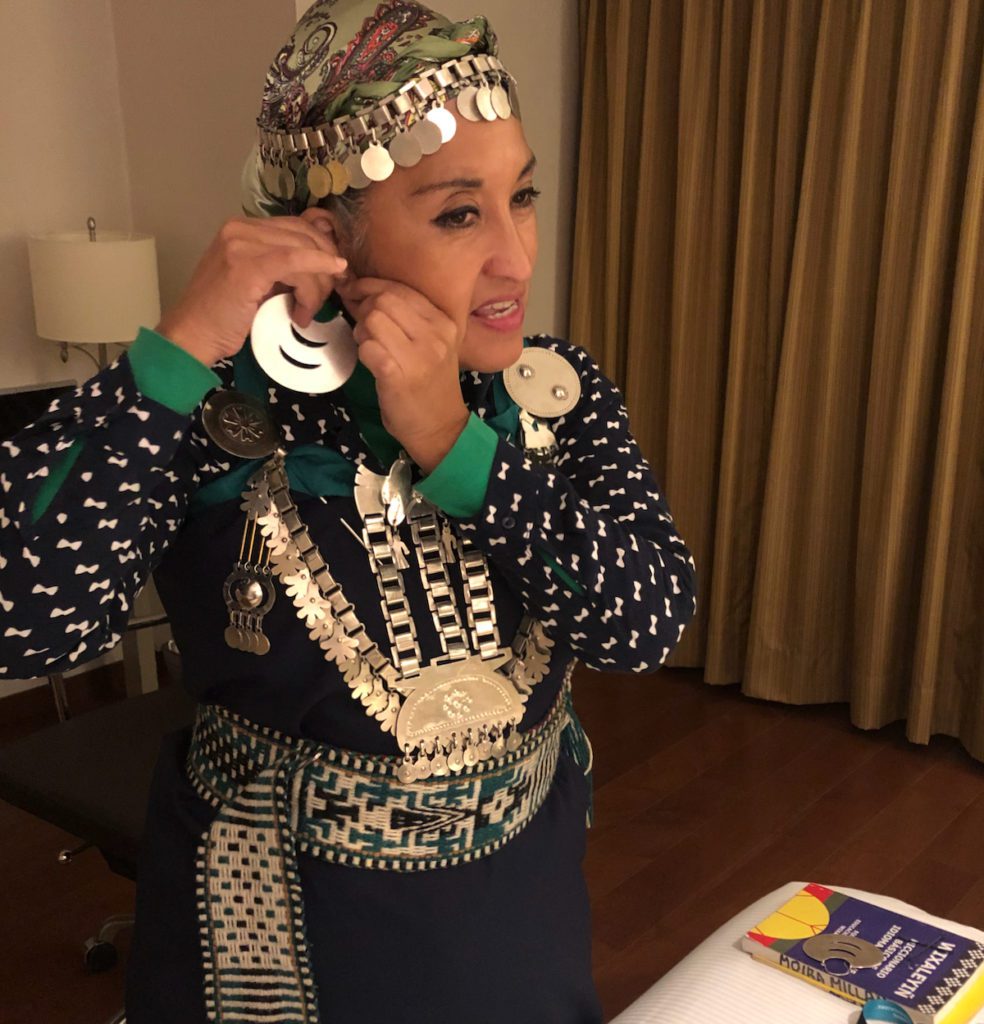
What is our proposal against patriarchy, capitalism? We are not feminists, we do not feel feminist. We feel united with feminism, but we are not feminists, we are anti-patriarchal. I always say, feminism does not have a monopoly. Feminism is a majority expression, but it is not the only expression that opposes patriarchy. And in that opposition to the patriarchy, we actually come to challenge everything.
Feminism comes to challenge the power of the patriarchy, it disputes the power of the patriarchy. We come to challenge power as a concept and propose the restoration of a cosmogonic order, of reciprocity, of respect and of loving kindness, not only between genders, not only between humans, but also with all of nature. So there cannot be for us an anti-patriarchal struggle without an anti-colonial struggle; there cannot be a struggle for the liberation of our bodies and territories if there is not a struggle for the liberation of the territories and the self-determination of the peoples. And these struggles, those multiple objectives, are assembled into one, which is the recovery of buen vivir — good living — as a right. That is our proposal as indigenous women, the recovery of good living as a right.
So our fight against patriarchy is joining with the fight also for the reaffirmation of life in the territories. When we recover territory we try to establish there a way of living in harmony with the land, recovering all the precepts and legacies of our ancestors.
I always say that in the indigenous world we do not receive inheritance because inheritance is also a concept of Wingka, it is of Wingkaland (non-indigenous society). But we don’t receive an inheritance; we receive a legacy. Those legacies are ways of inhabiting the world that we must defend.
Wingkaland — what Wingkaland is for us is that logic, it is that civilization, it is that civilizational matrix that reigns in the world, which is anthropocentric, which is patriarchal, which is racist, which is individualist, which is materialist. This vision of the world that Wingkaland has is the one that has prevailed, that has been globalized and that has been established in our territories. Wingkaland no longer has anything to teach, because in these centuries of imposing its thinking, the only thing that has emerged has been to bring death.
Where will hope emerge, the possibility of building an alternative civilizational matrix? From the Indo-America of the indigenous peoples and indigenous women we are precisely raising and recovering that way of thought and uniting and articulating with the womens’ movements of the world.
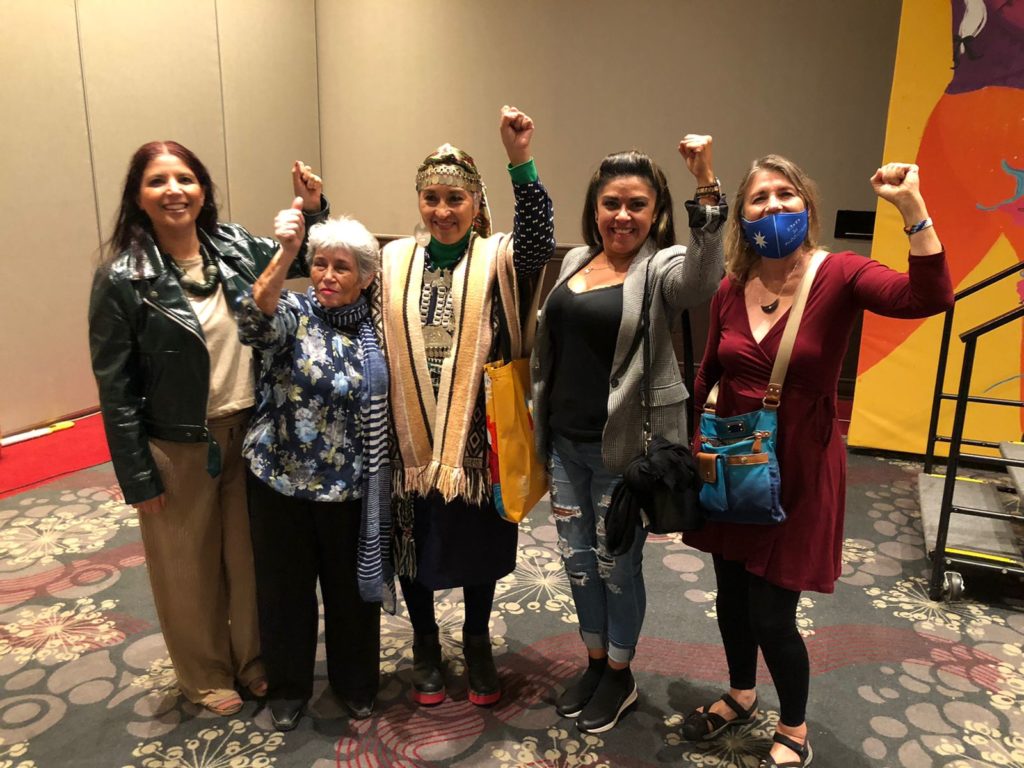
Because in reality what is emerging with this telluric movement — because it is telluric, arising from the Earth — you see that we women have a wisdom that has emerged from our academic preparation process. I am not an academic, but I say the different social movements, they are schools through which we have passed. In reality the telluric movement on Earth is awakening the women of the world. The Earth is also awakening us to diversities.
The Earth, the spiritual forces, the Earth are awakening us because we must destroy this system. Integration is not possible, it is not an option. The only option is the disintegration of this system so that an alternative system can be born. And so we are waking up, because this fight is not only political, it is a spiritual fight as well.
That is why religious groups, which are precisely the opposition, those religious groups that are being constituted as political forces, interfering in our territories, come to carry out spiritual extractivism, they become cultural extractivism, as academia once did as well. Cultural extractivism in the communities, in the towns, in the indigenous nations. So this telluric force comes to present us with a great challenge, which is to reconnect with the Earth, which of course in these formats will be impossible.
In these formats, as we face these times of the system, they take away our words — imagine the difficulties we have so that we can find the deep truth and the necessary time and space, when this system is all the time violating us, even the very spaces where we are to bring our thoughts and our knowledge. It is a real shame that I have come 8,000 kilometers and I cannot finish explaining the struggle and the thought — but luckily we do not speak with words, we also speak with deeds, because our actions determine us.
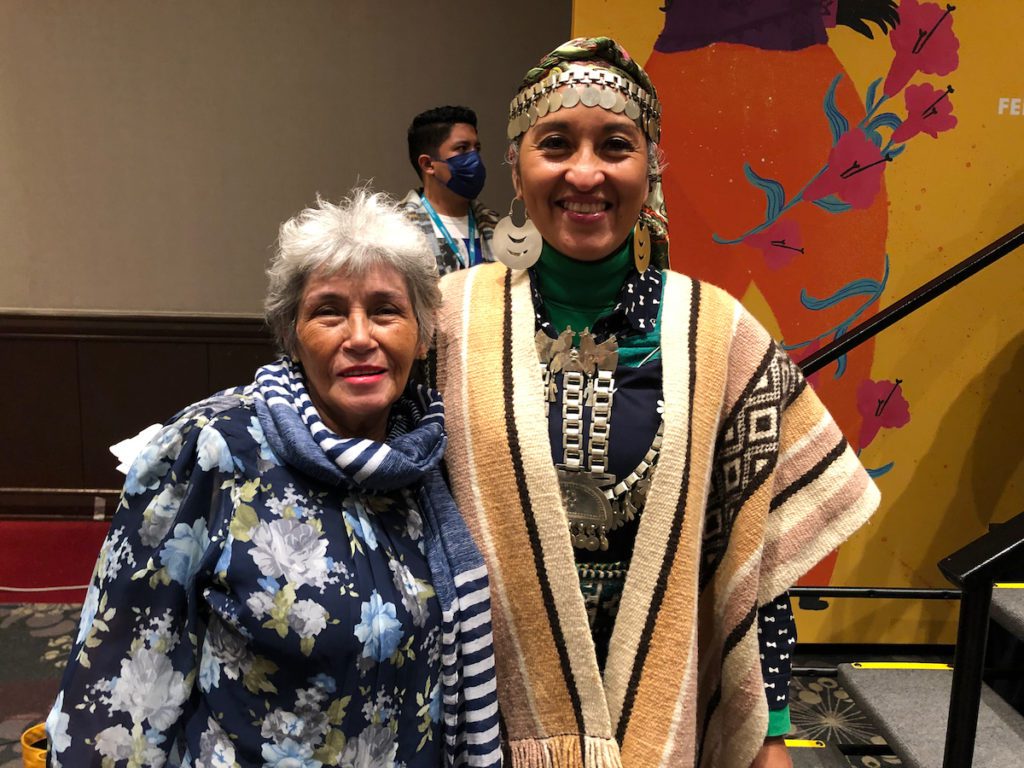
- ‘Planting Is a Right’: Guadalajara’s Urban Ag Rebels Rally Against Proposed Regulations — Again - January 21, 2026
- The women who kept a Mexican pueblo above water — and stopped a megadam - January 15, 2026
- Reading the Earth: How Mexican scientists are using nature to find the disappeared - January 7, 2026
Indigenous women everywhere are living these times knowing our deep responsibility to the earth, and all our relatives. It’s the time of the seventh fire to light the eighth fire.